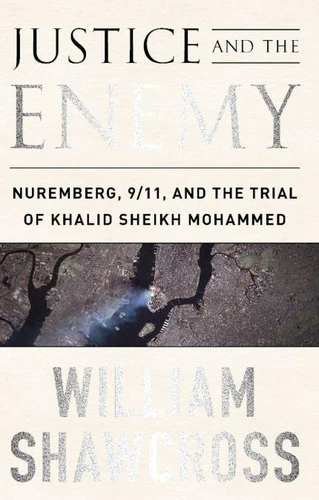Justice and the Enemy. Nuremberg, 9/11, and the Trial of Khalid Sheikh Mohammed
Par :Formats :
Disponible dans votre compte client Decitre ou Furet du Nord dès validation de votre commande. Le format ePub protégé est :
- Compatible avec une lecture sur My Vivlio (smartphone, tablette, ordinateur)
- Compatible avec une lecture sur liseuses Vivlio
- Pour les liseuses autres que Vivlio, vous devez utiliser le logiciel Adobe Digital Edition. Non compatible avec la lecture sur les liseuses Kindle, Remarkable et Sony
- Non compatible avec un achat hors France métropolitaine
 , qui est-ce ?
, qui est-ce ?Notre partenaire de plateforme de lecture numérique où vous retrouverez l'ensemble de vos ebooks gratuitement
Pour en savoir plus sur nos ebooks, consultez notre aide en ligne ici
- Nombre de pages272
- FormatePub
- ISBN978-1-58648-976-2
- EAN9781586489762
- Date de parution09/01/2012
- Protection num.Adobe DRM
- Infos supplémentairesepub
- ÉditeurPublicAffairs
Résumé
Since the Nuremberg Trials of 1945, lawful nations have struggled to impose justice around the world, especially when confronted by tyrannical and genocidal regimes. But in Cambodia, the USSR, China, Bosnia, Rwanda, and beyond, justice has been served haltingly if at all in the face of colossal inhumanity. International Courts are not recognized worldwide. There is not a global consensus on how to punish transgressors.
The war against Al Qaeda is a war like no other. Osama bin Laden, Al Qaeda's founder, was killed in Pakistan by Navy Seals. Few people in America felt anything other than that justice had been served. But what about the man who conceived and executed the 9/11 attacks on the US, Khalid Sheikh Mohammed? What kind of justice does he deserve? The U. S. has tried to find the high ground by offering KSM a trial -- albeit in the form of military tribunal.
But is this hypocritical? Indecisive? Half-hearted? Or merely the best application of justice possible for a man who is implacably opposed to the civilization that the justice system supports and is derived from? In this book, William Shawcross explores the visceral debate that these questions have provoked over the proper application of democratic values in a time of war, and the enduring dilemma posed to all victors in war: how to treat the worst of your enemies.
The war against Al Qaeda is a war like no other. Osama bin Laden, Al Qaeda's founder, was killed in Pakistan by Navy Seals. Few people in America felt anything other than that justice had been served. But what about the man who conceived and executed the 9/11 attacks on the US, Khalid Sheikh Mohammed? What kind of justice does he deserve? The U. S. has tried to find the high ground by offering KSM a trial -- albeit in the form of military tribunal.
But is this hypocritical? Indecisive? Half-hearted? Or merely the best application of justice possible for a man who is implacably opposed to the civilization that the justice system supports and is derived from? In this book, William Shawcross explores the visceral debate that these questions have provoked over the proper application of democratic values in a time of war, and the enduring dilemma posed to all victors in war: how to treat the worst of your enemies.
Since the Nuremberg Trials of 1945, lawful nations have struggled to impose justice around the world, especially when confronted by tyrannical and genocidal regimes. But in Cambodia, the USSR, China, Bosnia, Rwanda, and beyond, justice has been served haltingly if at all in the face of colossal inhumanity. International Courts are not recognized worldwide. There is not a global consensus on how to punish transgressors.
The war against Al Qaeda is a war like no other. Osama bin Laden, Al Qaeda's founder, was killed in Pakistan by Navy Seals. Few people in America felt anything other than that justice had been served. But what about the man who conceived and executed the 9/11 attacks on the US, Khalid Sheikh Mohammed? What kind of justice does he deserve? The U. S. has tried to find the high ground by offering KSM a trial -- albeit in the form of military tribunal.
But is this hypocritical? Indecisive? Half-hearted? Or merely the best application of justice possible for a man who is implacably opposed to the civilization that the justice system supports and is derived from? In this book, William Shawcross explores the visceral debate that these questions have provoked over the proper application of democratic values in a time of war, and the enduring dilemma posed to all victors in war: how to treat the worst of your enemies.
The war against Al Qaeda is a war like no other. Osama bin Laden, Al Qaeda's founder, was killed in Pakistan by Navy Seals. Few people in America felt anything other than that justice had been served. But what about the man who conceived and executed the 9/11 attacks on the US, Khalid Sheikh Mohammed? What kind of justice does he deserve? The U. S. has tried to find the high ground by offering KSM a trial -- albeit in the form of military tribunal.
But is this hypocritical? Indecisive? Half-hearted? Or merely the best application of justice possible for a man who is implacably opposed to the civilization that the justice system supports and is derived from? In this book, William Shawcross explores the visceral debate that these questions have provoked over the proper application of democratic values in a time of war, and the enduring dilemma posed to all victors in war: how to treat the worst of your enemies.











